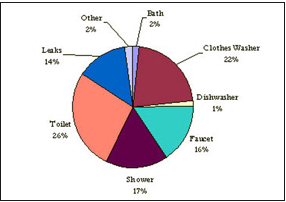|
Click on photo to view larger image


|
Maryland’s greatest water use occurs during the summer months, and this year will be no exception. With high temperatures, residential water use can be considerably greater than during the winter months. There are simple things we can do inside or outside of our home to conserve water and reduce the impacts of water use on the environment.
Conserving water protects the environment and saves money. Water conservation benefits the environment by reducing the volume of wastewater flowing to treatment plants and septic systems, enabling more efficient treatment and lowering waste disposal. Water conservation can also preserve the free flow and retain the value of stream and river systems as wildlife habitats and recreational areas. Conserving water saves money. The U.S. Environmental Protection Agency estimates that the average household spends about $500 per year on its water and sewer bill. By making just a few simple changes, you can save about $170 per year.
Tips for Saving Water Inside Home
Approximately 60 percent of total household water supply is used inside the home. These tips will reduce water use indoors:
-
Repair leaky pipes and fixtures. A leaking toilet could waste up to 9,000 gallons per year.
-
Replace old faucets and showerheads with new water-efficient models or install aerators to reduce flow. Replacing faucets and showerheads in an average home will save 2,900 gallons of water per year and $58 in water and energy bills.
-
Install low flow toilets or toilet dams. Toilets installed before 1980 use significantly more water than new toilets. In an average home, replacing the toilets can save $110 and 18,000 gallons of water per year -- enough water to fill two swimming pools.
-
Run the dishwasher and washer only when full. Don’t pre-rinse dishes before loading into dishwasher.
-
When purchasing a new dishwasher or washer, consider water and energy efficient models. A new high-efficiency washer uses 50 percent less water and energy than an older model. In addition, you may be eligible for a rebate from the Maryland Energy Administration.
Tips for Saving Water Outside Home
During a hot Maryland summer, water use outside the home can be 50 to 100 percent greater than during the winter. Follow these tips to reduce water use outdoors:
-
Limit grass areas and use drought resistant trees, shrubs, groundcovers, and even rocks to landscape your garden; grass turf requires 30 to 50 percent more water than do shrubs and other groundcover. Raise your lawn mower blade to at least three inches; taller grass has a deeper root system, shades the roots, and holds soil moisture better.
-
If you irrigate, install efficient irrigation systems such as drip irrigation, soil soakers, and efficient sprinkler systems. Set sprinklers so that they sprinkle the lawn and garden, not the street or sidewalk.
-
Water the lawn only when the ground is dry and preferably no more than once a week. The amount of water used by a sprinkler in 30 minutes is equal to the daily water needs of a family of four.
-
Water during the coolest part of the day (preferably morning) and never water on windy days. As much as 30 percent of the water can be lost to evaporation by watering during midday.
-
Select plants and turf that are native to Maryland or that have low water requirements. Pull weeds to decrease competition for water and apply mulch to reduce evaporation and prevent weed growth.
-
Repair or replace leaking hoses and sprinklers.
-
Always use an automatic shut off nozzle on hoses and save up to 150 gallons while washing the car.
-
Use a broom rather than a hose to clean decks, sidewalks, and other paved areas. Five minutes of running the hose can use 25 gallons of water.
-
Collect rainwater for reuse whenever possible. Build your own rain barrel. Click here to learn how.
-
Cover your swimming pool to prevent evaporation. The average sized pool loses 1,000 gallons per month in the summer heat.
For more information, visit these websites:
MDE Water Conservation
U.S. Environmental Protection Agency’s Water Sense Program
Maryland Energy Administration
|